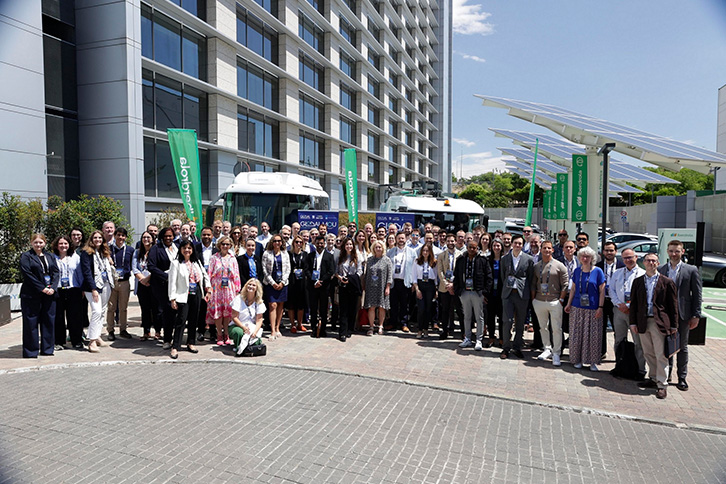News
2024-06-12 16:54:00.0 - 2024-06-12 16:54:00.0 UTC +02:00Over 20 Governments meet at Iberdrola to promote transport electrification
- Iberdrola hosts at its headquarters in Madrid the Drive to Zero global conference for decarbonising transport jointly organised by Calstart and the Government of the Netherlands.
- Drive to Zero aims for 30% of all new heavy-duty vehicles to be zero emission by 2030 and 100% by 2040 to achieve a net zero emission fleet by 2050.
Over 20 Governments, mostly from Europe, America and Africa, and more than 50 other organisations from around the world gathered today at Iberdrola's headquarters to celebrate the annual Drive to Zero conferences − a global alliance for decarbonising heavy road transport, of which the Company has been a member since 2022.
The conference sessions, which will last until next Friday, are being held as a global meeting point to promote decarbonisation and the search for sustainable transport solutions in different countries and organisations.
During the different sessions, the opportunities and challenges of electrifying transport will be discussed in order to leave behind the dependence on fossil fuels and accelerate the deployment of clean energies worldwide to achieve the transition to an economic model based on renewable generation.
Europe is the fastest warming continent and its temperatures are rising at about twice the global average. Zero-emission medium and heavy-duty vehicles are now a reality and are key to solving the climate crisis. The way is promoting healthier air and offering economic and operational benefits for logistics operators and for the countries themselves − achieving independence from fossil fuels.
Drive to Zero is an initiative of the Dutch Government and CALSTART/Drive to Zero, a Californian sustainable transport advocacy organisation. Its members include nearly 40 countries, as well as cities, regions, non-governmental organisations, companies and universities.
Drive to Zero promotes 30% of new heavy-duty vehicles to be zero-emission by 2030, and 100% by 2040 to achieve a net zero emission fleet by 2050. These conferences aim to deepen the collaboration and cooperation of its members to achieve these goals.
Road to electrification
Road transport is essential to global society as it enables the transport of people, goods and products, but it is responsible for approximately 25% of all greenhouse gas emissions worldwide, according to the International Energy Agency (IEA). Furthermore, road transport also pollutes the air we breathe.
Zero-emission mobility is a key part of the energy transition: developing green transport is essential to achieve decarbonisation and mitigate the consequences of climate change and pollution. In the logistics sector, electric trucks present a technologically and economically viable solution − and are the most efficient and cleanest alternative to move towards a greener future.
The electric motor will help to reduce air pollution and noise levels, which will contribute to improving the health of citizens. It is the only technology based on renewable energies that is also efficient, quiet and achieves zero emissions.
In order to accelerate the transition to zero emissions in heavy road transport and towards the decarbonisation of a decarbonised economy independent of fossil fuels, Iberdrola is part of various organisations and last year signed an agreement with AEDIVE, the Business Association for the Development and Promotion of electric mobility, to create an alliance to strengthen the electrification of the heavy vehicle sector in Spain.
Among the Company's milestones in the field of heavy transport is the development of the Mediterranean Corridor for high-power electric charging of heavy vehicles − with the most powerful hub in southern Europe. In addition, together with Disfrimur, over 160 charging points for electric trucks will be installed in the logistics bases that the transport company has in the country.
Through the Iberdrola | bp pulse alliance, Iberdrola will launch the first MCS (Megawatt Charging System) charger for heavy electric vehicles in southern Europe, which will have a capacity of over 1,000 kW.







